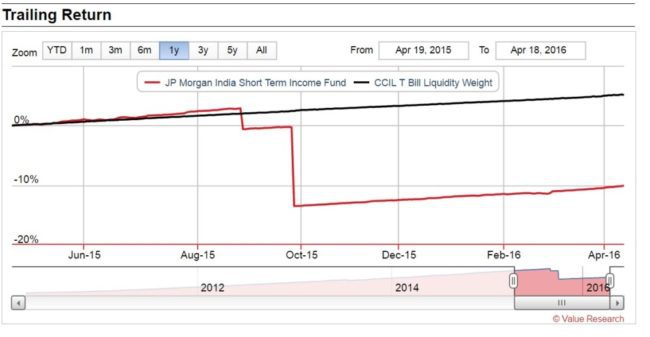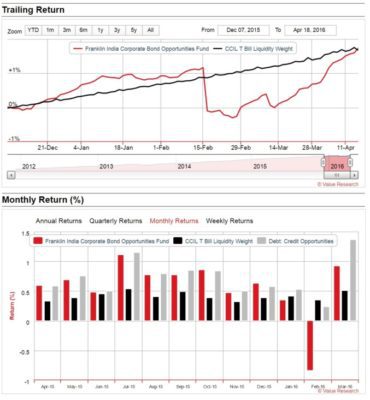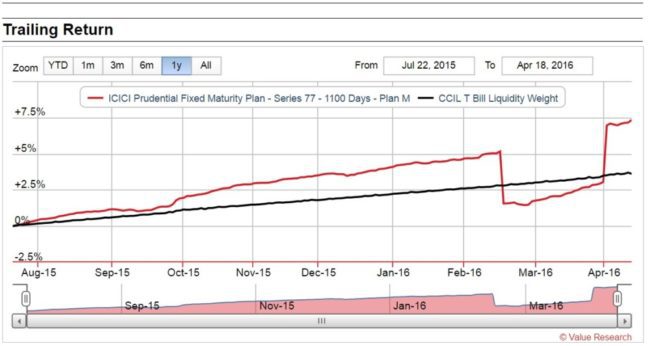Last Updated on September 4, 2018 at 5:33 am
In the last ten months, we have had three instances of credit rating downgrades in mutual fund portfolios. We had discussed these in some detail and also suggested ways to choose debt mutual funds with no credit risk and low volatility. In this post, let us look at how these funds have recovered and what we can learn about credit risk in debt mutual funds.
First some basics. A credit rating represents the perceived ability of a borrower to repay the principal and interest thereon. When the credit rating of a bond falls, its market value drops and it could become difficult to sell. Therefore the NAV of the fund that holds such bonds will fall. However, if the borrower is able to honor all payments, the NAV will recover. Read more: Understanding Credit Rating Risk in Debt Mutual Funds.
Amtek Auto JP Morgan made two mistakes. It combined concentration risk with credit risk and had a huge (~15%) exposure to Amtek Auto which was an AA- bond to begin with. When the bond was downgraded to C, the NAV of JP Morgan Short Term Income Fund and JP Morgan India Treasury Fund fell by -3.38% and – 1.73% on Aug. 27.
Unable to find a seller for the downgraded bonds, the AMC decided to gate redemptions. Soon it came up with an innovative idea of dividing the NAV into a good NAV (all securities except Amtek) and a bad NAV (Amtek bonds) and was able to honor redemption requests and eventually sell most of Amtek bonds. Have a look at the NAV evolution of JP Morgan Short Term Income Fund.
Join 32,000+ readers and get free money management solutions delivered to your inbox! Subscribe to get posts via email! (Link takes you to our email sign-up form)
🔥Want to create a complete financial plan? Learn goal-based investing? Exclusive access to our DIY tools? Increase your income with your skills? Enjoy massive discounts on our robo-advisory tool & courses! 🔥

Since then, SEBI has rejected the MF industries proposal to segregate band bonds like JP Morgan did as it would encourage excessive risk taking. A good move, in my opinion.
Also, JP Morgan is to sell its AMC business to Edelweiss. It is not clear what role the Amtek debacle played a role in this move, but it should have had an impact.
Jindal Steel and Power Ltd Franklin Templeton has been walking the wire for quite a while by taking on large amounts of low rates corporate bonds in several schemes. While the going was good, it was hailed for its ‘research’ and the ‘competence’of its fund manager. There was only one way the party could end -badly.
On 16th Feb., JSPL bonds were downgraded. Open-ended funds of 7 Franklin funds and 10 FMPs of ICICI held these bonds and their NAV fell. See tweets by Manoj Nagpal here.
Franklin Templeton probably fearing redemption pressure and not wanting to go through what JP Morgan swiftly found an unknown buyer a booked a capital loss by selling all JSPL securities (announced on Mar 10th).
On the other hand, ICICI did not have any redemption pressure since the funds were FMPs, held on to the JSPL bonds, in the hope that firm will honor payments and not default.
Mint reported that Franklin has lost 512 Crore due to JSPL off-loading and said, “JSPL is going through some tough times because of external factors like Chinese slowdown and the failed auction of coal blocks. It did not default on any payments to Templeton. The sell-off, therefore, seems to be a panic reaction by Templeton,”
While, I am no fan of Franklins risk debt fund strategy, especially their Corporate Opportunities bond fund, I think Franklin was correct to swiftly get rid of the downgraded bonds.
They were able to quickly prevent mass redemption because of this. Take the case of Franklin Corporate Opportunities Bond Fund. It has an AUM of 7851.28 Crores on Jan 29 2016. As on Mar 31st, the AUM is 7050.53 Cr, which is remarkable! I think this s only because they could get rid of the JSPL.
Would they have sold it had only affected FMPs? Has their reputation taken a hit? We can only speculate.

Notice how the NAV fell twice, once when the rating was downgraded and another when the bonds were sold. The monthly returns are plotted below and the negative returns stick out prominently. Notice that the return for March is reasonably good. So despite having booked the loss, the fund seems to have quickly bounced back. However, the damage done will not go away easily and further inflows will not be as robust as in the past. The fund has always had a stormy past and if that is not something you are comfortable with, stay away from it.
While Franklin was trying to find a buyer, ICICI held onto to those bonds. JSPL has now paid 200 Crore of 500 Crores it owes ICIC. That is, bonds which matured this month have been honored by JSPL. As a result, notice that how the NAV has bounced back for series 77 FMP.
In spite of the rating downgrade (JPSL’s was D for default because of delay in interest payment, which is when Franklin sold them), if a borrower is able to honor the bond, the NAV bounces back as shown above. However due to the time value of money, it will affect returns.
Did ICICI take a big risk in holding onto these bonds? Did it get lucky? Did Franklin sell in a panic? It is easy to ask these questions now. As mentioned above, what Franklin did is justified.
Sunil Jhaveri advised mutual fund distributors to not panic and not create panic (that is how I came to know about the JSPL payment to ICICI). While I do not disagree with that, we will have to recognise that debt mutual funds are sold as alternatives to fixed deposits by highlighting tax benefits. Is the emphasis on associated risk as strong? Can debt funds or any product get sold if risks are highlighted?
While I agree that debt funds are more tax efficient, choice of fund category is crucial. One cannot get return without risk in a market linked product. For investors like me who like to isolate risk to equities and prefer stable fixed income, I would recommend liquid funds, ultra short-term funds, and short-term gilt funds. Or one can use arbitrage funds or equity-savings funds with short-term bonds.
Those who wish to chase after the risk premium available in corporate bonds must not complain when there are credit downgrades and associated unpleasantness.
🔥Enjoy massive discounts on our courses, robo-advisory tool and exclusive investor circle! 🔥& join our community of 7000+ users!
Use our Robo-advisory Tool for a start-to-finish financial plan! ⇐ More than 2,500 investors and advisors use this!
Track your mutual funds and stock investments with this Google Sheet!
We also publish monthly equity mutual funds, debt and hybrid mutual funds, index funds and ETF screeners and momentum, low-volatility stock screeners.





- Do you have a comment about the above article? Reach out to us on Twitter: @freefincal or @pattufreefincal
- Have a question? Subscribe to our newsletter using the form below.
- Hit 'reply' to any email from us! We do not offer personalized investment advice. We can write a detailed article without mentioning your name if you have a generic question.
Join 32,000+ readers and get free money management solutions delivered to your inbox! Subscribe to get posts via email! (Link takes you to our email sign-up form)
About The Author
 Dr M. Pattabiraman(PhD) is the founder, managing editor and primary author of freefincal. He is an associate professor at the Indian Institute of Technology, Madras. He has over ten years of experience publishing news analysis, research and financial product development. Connect with him via Twitter(X), Linkedin, or YouTube. Pattabiraman has co-authored three print books: (1) You can be rich too with goal-based investing (CNBC TV18) for DIY investors. (2) Gamechanger for young earners. (3) Chinchu Gets a Superpower! for kids. He has also written seven other free e-books on various money management topics. He is a patron and co-founder of “Fee-only India,” an organisation promoting unbiased, commission-free investment advice.
Dr M. Pattabiraman(PhD) is the founder, managing editor and primary author of freefincal. He is an associate professor at the Indian Institute of Technology, Madras. He has over ten years of experience publishing news analysis, research and financial product development. Connect with him via Twitter(X), Linkedin, or YouTube. Pattabiraman has co-authored three print books: (1) You can be rich too with goal-based investing (CNBC TV18) for DIY investors. (2) Gamechanger for young earners. (3) Chinchu Gets a Superpower! for kids. He has also written seven other free e-books on various money management topics. He is a patron and co-founder of “Fee-only India,” an organisation promoting unbiased, commission-free investment advice.Our flagship course! Learn to manage your portfolio like a pro to achieve your goals regardless of market conditions! ⇐ More than 3,000 investors and advisors are part of our exclusive community! Get clarity on how to plan for your goals and achieve the necessary corpus no matter the market condition is!! Watch the first lecture for free! One-time payment! No recurring fees! Life-long access to videos! Reduce fear, uncertainty and doubt while investing! Learn how to plan for your goals before and after retirement with confidence.
Our new course! Increase your income by getting people to pay for your skills! ⇐ More than 700 salaried employees, entrepreneurs and financial advisors are part of our exclusive community! Learn how to get people to pay for your skills! Whether you are a professional or small business owner who wants more clients via online visibility or a salaried person wanting a side income or passive income, we will show you how to achieve this by showcasing your skills and building a community that trusts and pays you! (watch 1st lecture for free). One-time payment! No recurring fees! Life-long access to videos!
Our new book for kids: “Chinchu Gets a Superpower!” is now available!


Must-read book even for adults! This is something that every parent should teach their kids right from their young age. The importance of money management and decision making based on their wants and needs. Very nicely written in simple terms. - Arun.Buy the book: Chinchu gets a superpower for your child!
How to profit from content writing: Our new ebook is for those interested in getting side income via content writing. It is available at a 50% discount for Rs. 500 only!
Do you want to check if the market is overvalued or undervalued? Use our market valuation tool (it will work with any index!), or get the Tactical Buy/Sell timing tool!
We publish monthly mutual fund screeners and momentum, low-volatility stock screeners.
About freefincal & its content policy. Freefincal is a News Media Organization dedicated to providing original analysis, reports, reviews and insights on mutual funds, stocks, investing, retirement and personal finance developments. We do so without conflict of interest and bias. Follow us on Google News. Freefincal serves more than three million readers a year (5 million page views) with articles based only on factual information and detailed analysis by its authors. All statements made will be verified with credible and knowledgeable sources before publication. Freefincal does not publish paid articles, promotions, PR, satire or opinions without data. All opinions will be inferences backed by verifiable, reproducible evidence/data. Contact information: To get in touch, use this contact form. (Sponsored posts or paid collaborations will not be entertained.)
Connect with us on social media
- Twitter @freefincal
- Subscribe to our YouTube Videos
- Posts feed via Feedburner.
Our publications
You Can Be Rich Too with Goal-Based Investing
 Published by CNBC TV18, this book is meant to help you ask the right questions and seek the correct answers, and since it comes with nine online calculators, you can also create custom solutions for your lifestyle! Get it now.
Published by CNBC TV18, this book is meant to help you ask the right questions and seek the correct answers, and since it comes with nine online calculators, you can also create custom solutions for your lifestyle! Get it now.Gamechanger: Forget Startups, Join Corporate & Still Live the Rich Life You Want
 This book is meant for young earners to get their basics right from day one! It will also help you travel to exotic places at a low cost! Get it or gift it to a young earner.
This book is meant for young earners to get their basics right from day one! It will also help you travel to exotic places at a low cost! Get it or gift it to a young earner.Your Ultimate Guide to Travel
 This is an in-depth dive into vacation planning, finding cheap flights, budget accommodation, what to do when travelling, and how travelling slowly is better financially and psychologically, with links to the web pages and hand-holding at every step. Get the pdf for Rs 300 (instant download)
This is an in-depth dive into vacation planning, finding cheap flights, budget accommodation, what to do when travelling, and how travelling slowly is better financially and psychologically, with links to the web pages and hand-holding at every step. Get the pdf for Rs 300 (instant download)